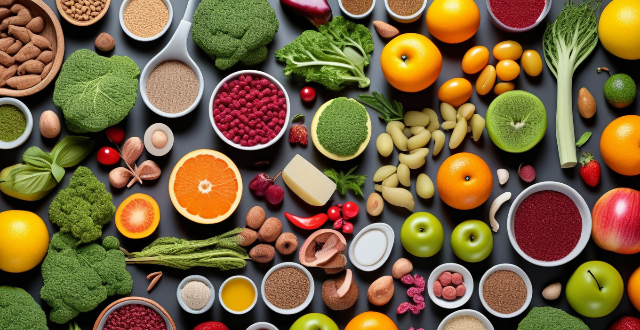Nutrient-dense foods are crucial for maintaining good health and preventing disease. Examples include leafy greens, berries, nuts & seeds, whole grains, fish & seafood, meat & poultry, legumes, cruciferous vegetables, herbs & spices, fruits, and dairy or alternatives. Incorporating these foods into your diet ensures you get essential nutrients for optimal body function and long-term well-being.

Nutrient-Dense Foods: Boosting Your Health with Every Bite
Nutrient-dense foods are those that provide substantial amounts of vitamins, minerals, and other health-promoting compounds relative to their calorie content. These foods play a crucial role in maintaining good health and preventing disease. Here's a detailed look at some examples of nutrient-dense foods:
Leafy Greens
- Kale: High in vitamin K, vitamin C, and antioxidants.
- Spinach: Rich in iron, folate, and vitamins A and C.
- Collard Greens: Excellent source of calcium, vitamin K, and fiber.
Berries
- Blueberries: Packed with antioxidants, vitamin C, and fiber.
- Strawberries: Contain high levels of vitamin C and folate.
- Raspberries: Provide vitamin C, fiber, and antioxidants.
Nuts and Seeds
- Almonds: High in healthy fats, protein, and vitamin E.
- Chia Seeds: Good source of omega-3 fatty acids, fiber, and calcium.
- Walnuts: Contain omega-3s and significant amounts of antioxidants.
Whole Grains
- Quinoa: Known for its high protein content and fiber.
- Oats: Provide fiber, magnesium, and potassium.
- Brown Rice: Rich in selenium and contains beneficial fiber.
Fish and Seafood
- Salmon: High in omega-3 fatty acids and vitamin D.
- Sardines: Source of calcium, vitamin D, and omega-3s.
- Trout: Contains protein, vitamin D, and omega-3s.
Meat and Poultry
- Grass-fed Beef: Higher in omega-3s and lower in saturated fat than grain-fed beef.
- Turkey Breast: Low in fat, high in protein and selenium.
- Chicken Breast: Excellent source of lean protein.
Legumes
- Lentils: High in fiber, iron, and plant-based protein.
- Chickpeas: Contain protein, fiber, and iron.
- Black Beans: Rich in fiber and folate.
Cruciferous Vegetables
- Broccoli: High in vitamin C, vitamin K, and fiber.
- Cauliflower: Provides vitamin C, vitamin K, and antioxidants.
- Kale: Also considered a cruciferous vegetable, rich in vitamins and minerals.
Herbs and Spices
- Turmeric: Contains curcumin, a potent antioxidant.
- Cinnamon: May help regulate blood sugar levels.
- Ginger: Has anti-inflammatory properties.
Fruits
- Avocado: Rich in healthy fats, fiber, and potassium.
- Apples: Contain fiber and antioxidants.
- Oranges: High in vitamin C and fiber.
Dairy Products or Alternatives
- Yogurt: Can be a good source of probiotics and calcium.
- Fortified Plant-Based Milks: Often enriched with vitamins and minerals like calcium, vitamin D, and vitamin B12.
By incorporating these nutrient-dense foods into your diet, you can ensure that you're getting the essential nutrients your body needs to function optimally while also promoting long-term health and well-being.